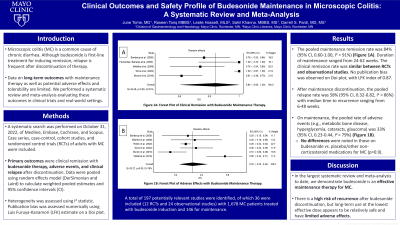Monday Poster Session
Category: Colon
P1591 - Clinical Outcomes and Safety Profile of Budesonide Maintenance in Microscopic Colitis: A Systematic Review and Meta-Analysis
Monday, October 23, 2023
10:30 AM - 4:15 PM PT
Location: Exhibit Hall

Has Audio

June Tome, MD
Mayo Clinic
Rochester, MN
Presenting Author(s)
June Tome, MD, Raseen Tariq, MBBS, Leslie Hassett, MLS, Sahil Khanna, MBBS, MS, Darrell S.. Pardi, MD, MS
Mayo Clinic, Rochester, MN
Introduction: Microscopic colitis (MC) is a common cause of chronic diarrhea. Although budesonide is first-line treatment for inducing remission, relapse is frequent after the discontinuation of therapy. Data on long-term outcomes with maintenance therapy as well as potential adverse effects and tolerability are limited. We performed a systematic review and meta-analysis evaluating these outcomes in clinical trials and real-world settings.
Methods: A systematic search was performed on October 31, 2022 of Medline, Embase, Cochrane, and Scopus. Case series, case-control, cohort studies, and randomized control trials (RCTs) of adults with MC were included. Primary outcomes were clinical remission with budesonide therapy, adverse events, and clinical relapse after budesonide discontinuation. Data were pooled using random effects model described by DerSimonian and Laird to calculate weighted pooled estimates and 95% confidence intervals (CI). Heterogeneity was assessed using the I2 statistic. Publication bias was assessed numerically using the Luis Furuya-Kanamori (LFK) estimate on a Doi plot.
Results: A total of 197 potentially relevant studies were identified, of which 36 were included (12 RCTs and 24 observational studies) with 1,678 MC patients treated with budesonide induction and 146 for maintenance. The pooled remission rate with budesonide maintenance therapy was 84% (95% CI, 0.60-1.00, I2 = 91%) (Figure 1A). Duration of maintenance ranged from 24 to 62 weeks. The overall pooled clinical remission rate with budesonide treatment was similar between RCTs and observational studies. No publication bias was observed on the Doi plot, with LFK index of 0.87. After the discontinuation of maintenance, the pooled relapse rate was 58% (95% CI, 0.32-0.82, I2 = 86%) with median time to recurrence ranging from 6 to 48 weeks. On maintenance therapy, the pooled rate of adverse events (e.g., metabolic bone disease, hypertension, hyperglycemia, cataracts, glaucoma) was 33% (95% CI, 0.23-0.44, I2 = 79%) (Figure 1B). No differences were noted in adverse events in those on budesonide versus placebo or other non-corticosteroid medications for MC (p=0.9).
Discussion: In the largest systematic review and meta-analysis to date, we demonstrate budesonide is an effective maintenance therapy for MC. There is a high risk of recurrence after budesonide discontinuation, but long-term use at the lowest effective dose appears to be relatively safe and have limited adverse effects.

Disclosures:
June Tome, MD, Raseen Tariq, MBBS, Leslie Hassett, MLS, Sahil Khanna, MBBS, MS, Darrell S.. Pardi, MD, MS. P1591 - Clinical Outcomes and Safety Profile of Budesonide Maintenance in Microscopic Colitis: A Systematic Review and Meta-Analysis, ACG 2023 Annual Scientific Meeting Abstracts. Vancouver, BC, Canada: American College of Gastroenterology.
Mayo Clinic, Rochester, MN
Introduction: Microscopic colitis (MC) is a common cause of chronic diarrhea. Although budesonide is first-line treatment for inducing remission, relapse is frequent after the discontinuation of therapy. Data on long-term outcomes with maintenance therapy as well as potential adverse effects and tolerability are limited. We performed a systematic review and meta-analysis evaluating these outcomes in clinical trials and real-world settings.
Methods: A systematic search was performed on October 31, 2022 of Medline, Embase, Cochrane, and Scopus. Case series, case-control, cohort studies, and randomized control trials (RCTs) of adults with MC were included. Primary outcomes were clinical remission with budesonide therapy, adverse events, and clinical relapse after budesonide discontinuation. Data were pooled using random effects model described by DerSimonian and Laird to calculate weighted pooled estimates and 95% confidence intervals (CI). Heterogeneity was assessed using the I2 statistic. Publication bias was assessed numerically using the Luis Furuya-Kanamori (LFK) estimate on a Doi plot.
Results: A total of 197 potentially relevant studies were identified, of which 36 were included (12 RCTs and 24 observational studies) with 1,678 MC patients treated with budesonide induction and 146 for maintenance. The pooled remission rate with budesonide maintenance therapy was 84% (95% CI, 0.60-1.00, I2 = 91%) (Figure 1A). Duration of maintenance ranged from 24 to 62 weeks. The overall pooled clinical remission rate with budesonide treatment was similar between RCTs and observational studies. No publication bias was observed on the Doi plot, with LFK index of 0.87. After the discontinuation of maintenance, the pooled relapse rate was 58% (95% CI, 0.32-0.82, I2 = 86%) with median time to recurrence ranging from 6 to 48 weeks. On maintenance therapy, the pooled rate of adverse events (e.g., metabolic bone disease, hypertension, hyperglycemia, cataracts, glaucoma) was 33% (95% CI, 0.23-0.44, I2 = 79%) (Figure 1B). No differences were noted in adverse events in those on budesonide versus placebo or other non-corticosteroid medications for MC (p=0.9).
Discussion: In the largest systematic review and meta-analysis to date, we demonstrate budesonide is an effective maintenance therapy for MC. There is a high risk of recurrence after budesonide discontinuation, but long-term use at the lowest effective dose appears to be relatively safe and have limited adverse effects.

Figure: Figure 1A: Forest Plot of Clinical Remission with Budesonide Maintenance Therapy. Figure 1B: Forest Plot of Adverse Effects with Budesonide Maintenance Therapy.
Disclosures:
June Tome indicated no relevant financial relationships.
Raseen Tariq indicated no relevant financial relationships.
Leslie Hassett indicated no relevant financial relationships.
Sahil Khanna: Rebiotix / Ferring, Pfizer, Vedanta – Grant/Research Support. Seres, ProBiotech, Niche, Takeda – Consultant.
Darrell Pardi: Abbvie – Consultant. Boehringer Ingelheim – Consultant. ExeGI – Consultant, Grant/Research Support. Ferring – Consultant. Finch – Grant/Research Support. Immunic – Consultant. Merck – Consultant. Ohelio – Advisory Committee/Board Member. Otsuka – Consultant. Rebiotix – Grant/Research Support. Rise – Consultant, Grant/Research Support. Seres – Grant/Research Support. Summit – Consultant. Takeda – Grant/Research Support. Vedanta – Consultant.
June Tome, MD, Raseen Tariq, MBBS, Leslie Hassett, MLS, Sahil Khanna, MBBS, MS, Darrell S.. Pardi, MD, MS. P1591 - Clinical Outcomes and Safety Profile of Budesonide Maintenance in Microscopic Colitis: A Systematic Review and Meta-Analysis, ACG 2023 Annual Scientific Meeting Abstracts. Vancouver, BC, Canada: American College of Gastroenterology.
